项目代码/* -[ClockSketch v7.4]----------------------------------------------------------------------------------------
https://www.instructables.com/ClockSketch-V7-Part-I/
pre-configured for:
Lazy Grid Clock v2 (7x11)
https://www.instructables.com/Lazy-Grid-Clock-V2/
Arduino UNO/Nano/Pro Mini (AtMega328, 5V, 16 MHz), DS3231 RTC
December 2023 - Daniel Cikic
Serial Baud Rates:
Arduino: 57600
nodeMCU: 74880
-------------------------------------------------------------------------------------------------------------- */
// comment below to disable serial in-/output and free some RAM
#define DEBUG
// nodeMCU - uncomment to compile this sketch for nodeMCU 1.0 / ESP8266, make sure to select the proper board
// type inside the IDE! This mode is NOT supported and only experimental!
// #define NODEMCU
// useWiFi - enable WiFi support, WPS setup only! If no WPS support is available on a router check settings
// further down, set useWPS to false and enter ssid/password there
// #define USEWIFI
// useNTP - enable NTPClient, requires NODEMCU and USEWIFI. This will also enforce AUTODST.
// Configure a ntp server further down below!
// #define USENTP
// RTC selection - uncomment the one you're using, comment all others and make sure pin assignemts for
// DS1302 are correct in the parameters section further down!
// #define RTC_DS1302
// #define RTC_DS1307
#define RTC_DS3231
// autoDST - uncomment to enable automatic DST switching, check Time Change Rules below!
// #define AUTODST
// FADING - uncomment to enable fading effects for dots/digits, other parameters further down below
// #define FADING
// autoBrightness - uncomment to enable automatic brightness adjustments by using a photoresistor/LDR
// #define AUTOBRIGHTNESS
// customDisplay - uncomment this to enable displayMyStuff(). It's an example of how to display values
// at specified times, like temperature readouts
// #define CUSTOMDISPLAY
// FastForward will speed up things and advance time, this is only for testing purposes!
// Disables AUTODST, USENTP and USERTC.
// #define FASTFORWARD
/* ----------------------------------------------------------------------------------------------------- */
#include <TimeLib.h> // "Time" by Michael Margolis, used in all configs
#include <EEPROM.h> // required for reading/saving settings to eeprom
/* Start RTC config/parameters--------------------------------------------------------------------------
Check pin assignments for DS1302 (SPI), others are I2C (A4/A5 on Arduino by default)
Currently all types are using the "Rtc by Makuna" library */
#ifdef RTC_DS1302
#include <ThreeWire.h>
#include <RtcDS1302.h>
ThreeWire myWire(7, 6, 8); // IO/DAT, SCLK, CE/RST
RtcDS1302<ThreeWire> Rtc(myWire);
#define RTCTYPE "DS1302"
#define USERTC
#endif
#ifdef RTC_DS1307
#include <Wire.h>
#include <RtcDS1307.h>
RtcDS1307<TwoWire> Rtc(Wire);
#define RTCTYPE "DS1307"
#define USERTC
#endif
#ifdef RTC_DS3231
#include <Wire.h>
#include <RtcDS3231.h>
RtcDS3231<TwoWire> Rtc(Wire);
#define RTCTYPE "DS3231"
#define USERTC
#endif
#if !defined ( USERTC )
#pragma message "No RTC selected, check definitions on top of the sketch!"
#endif
/* End RTC config/parameters---------------------------------------------------------------------------- */
/* Start WiFi config/parameters------------------------------------------------------------------------- */
#ifdef USEWIFI
const bool useWPS = true; // set to false to disable WPS and use credentials below
const char* wifiSSID = "maWhyFhy";
const char* wifiPWD = "5up3r1337r0xX0r!";
#endif
/* End WiFi config/parameters--------------------------------------------------------------------------- */
/* Start NTP config/parameters--------------------------------------------------------------------------
Using NTP will enforce autoDST, so check autoDST/time zone settings below! */
#ifdef USENTP
/* I recommend using a local ntp service (many routers offer them), don't spam public ones with dozens
of requests a day, get a rtc! ^^ */
//#define NTPHOST "europe.pool.ntp.org"
#define NTPHOST "192.168.2.1"
#ifndef AUTODST
#define AUTODST
#endif
#endif
/* End NTP config/parameters---------------------------------------------------------------------------- */
/* Start autoDST config/parameters ----------------------------------------------------------------------
Comment/uncomment/add TimeChangeRules as needed, only use 2 (tcr1, tcr2), comment out unused ones!
Enabling/disabling autoDST will require to set time again, clock will be running in UTC time if autoDST
is enabled, only display times are adjusted (check serial monitor with DEBUG defined!)
This will also add options for setting the date (Year/Month/Day) when setting time on the clock! */
#ifdef AUTODST
#include <Timezone.h> // "Timezone" by Jack Christensen
TimeChangeRule *tcr;
//-----------------------------------------------
/* US */
// TimeChangeRule tcr1 = {"tcr1", First, Sun, Nov, 2, -360}; // utc -6h, valid from first sunday of november at 2am
// TimeChangeRule tcr2 = {"tcr2", Second, Sun, Mar, 2, -300}; // utc -5h, valid from second sunday of march at 2am
//-----------------------------------------------
/* Europe */
TimeChangeRule tcr1 = {"tcr1", Last, Sun, Oct, 3, 60}; // standard/winter time, valid from last sunday of october at 3am, UTC + 1 hour (+60 minutes) (negative value like -300 for utc -5h)
TimeChangeRule tcr2 = {"tcr2", Last, Sun, Mar, 2, 120}; // daylight/summer time, valid from last sunday of march at 2am, UTC + 2 hours (+120 minutes)
//-----------------------------------------------
Timezone myTimeZone(tcr1, tcr2);
#endif
/* End autoDST config/parameters ----------------------------------------------------------------------- */
/* Start autoBrightness config/parameters -------------------------------------------------------------- */
uint8_t upperLimitLDR = 180; // everything above this value will cause max brightness (according to current level) to be used (if it's higher than this)
uint8_t lowerLimitLDR = 50; // everything below this value will cause minBrightness to be used
uint8_t minBrightness = 30; // anything below this avgLDR value will be ignored
const bool nightMode = false; // nightmode true -> if minBrightness is used, colorizeOutput() will use a single color for everything, using HSV
const uint8_t nightColor[2] = { 0, 90 }; // hue 0 = red, fixed brightness of 90, https://github.com/FastLED/FastLED/wiki/FastLED-HSV-Colors
float factorLDR = 1.0; // try 0.5 - 2.0, compensation value for avgLDR. Set dbgLDR true & define DEBUG and watch the serial monitor. Looking...
const bool dbgLDR = false; // ...for values roughly in the range of 120-160 (medium room light), 40-80 (low light) and 0 - 20 in the dark
#ifdef NODEMCU
uint8_t pinLDR = 0; // LDR connected to A0 (nodeMCU only offers this one)
#else
uint8_t pinLDR = 1; // LDR connected to A1 (in case somebody flashes this sketch on arduino and already has an ldr connected to A1)
#endif
uint8_t intervalLDR = 75; // read value from LDR every 75ms (most LDRs have a minimum of about 30ms - 50ms)
uint16_t avgLDR = 0; // we will average this value somehow somewhere in readLDR();
uint16_t lastAvgLDR = 0; // last average LDR value we got
/* End autoBrightness config/parameters ---------------------------------------------------------------- */
#define SKETCHNAME "ClockSketch v7.4"
#define CLOCKNAME "Lazy Grid Clock v2"
/* Start button config/pins----------------------------------------------------------------------------- */
#ifdef NODEMCU
const uint8_t buttonA = 13; // momentary push button, 1 pin to gnd, 1 pin to d7 / GPIO_13
const uint8_t buttonB = 14; // momentary push button, 1 pin to gnd, 1 pin to d5 / GPIO_14
#else
const uint8_t buttonA = 3; // momentary push button, 1 pin to gnd, 1 pin to d3
const uint8_t buttonB = 4; // momentary push button, 1 pin to gnd, 1 pin to d4
#endif
/* End button config/pins------------------------------------------------------------------------------- */
/* Start basic appearance config------------------------------------------------------------------------ */
const bool dotsBlinking = true; // false will completely disable any dots on LGCv2 (except in setup, 12h mode am/pm indication)
const bool leadingZero = false; // true = enable a leading zero, 9:00 -> 09:00, 1:30 -> 01:30...
uint8_t displayMode = 0; // 0 = 24h mode, 1 = 12h mode ("1" will also override setting that might be written to EEPROM!)
uint8_t colorMode = 0; // different color modes, setting this to anything else than zero will overwrite values written to eeprom, as above
uint16_t colorSpeed = 750; // controls how fast colors change, smaller = faster (interval in ms at which color moves inside colorizeOutput();)
const bool colorPreview = true; // true = preview selected palette/colorMode using "8" on all positions for 3 seconds
const uint8_t colorPreviewDuration = 3; // duration in seconds for previewing palettes/colorModes if colorPreview is enabled/true
const bool reverseColorCycling = false; // true = reverse color movements
const uint8_t brightnessLevels[3] {100, 140, 240}; // 0 - 255, brightness Levels (min, med, max) - index (0-2) will be saved to eeprom
uint8_t brightness = brightnessLevels[0]; // default brightness if none saved to eeprom yet / first run
#ifdef FADING
uint8_t fadePixels = 2; // fade pixels, 0 = disabled, 1 = only fade out pixels turned off, 2 = fade old out and fade new in
uint8_t fadeDelay = 20; // milliseconds between each fading step, 5-25 should work okay-ish
#endif
/* End basic appearance config-------------------------------------------------------------------------- */
/* End of basic config/parameters section */
/* End of feature/parameter section, unless changing advanced things/modifying the sketch there's absolutely nothing to do further down! */
/* library, wifi and ntp stuff depending on above config/parameters */
#ifdef NODEMCU
#if defined ( USENTP ) && !defined ( USEWIFI ) // enforce USEWIFI when USENTP is defined
#define USEWIFI
#pragma warning "USENTP without USEWIFI, enabling WiFi"
#endif
#ifdef USEWIFI
#include <ESP8266WiFi.h>
#include <WiFiUdp.h>
#endif
#endif
#ifdef USENTP
#include <NTPClient.h>
WiFiUDP ntpUDP;
NTPClient timeClient(ntpUDP, NTPHOST, 0, 60000);
#endif
/* end library stuff */
/* setting feature combinations/options */
#if defined ( FASTFORWARD )
bool firstLoop = true;
#ifdef USERTC
#undef USERTC
#endif
#ifdef USEWIFI
#undef USEWIFI
#endif
#ifdef USENTP
#undef USENTP
#endif
#ifdef AUTODST
#undef AUTODST
#endif
#endif
/* setting feature combinations/options */
/* Start of FastLED/clock stuff */
#define LEDSTUFF
#ifdef LEDSTUFF
#ifdef NODEMCU
#define FASTLED_ESP8266_RAW_PIN_ORDER // this means we'll be using the raw esp8266 pin order -> GPIO_12, which is d6 on nodeMCU
#define LED_PIN 12 // led data in connected to GPIO_12 (d6/nodeMCU)
#else
#define FASTLED_ALLOW_INTERRUPTS 0 // AVR + WS2812 + IRQ = https://github.com/FastLED/FastLED/wiki/Interrupt-problems
#define LED_PIN 6 // led data in connected to d6 (arduino)
#endif
#define LED_PWR_LIMIT 500 // 500mA - Power limit in mA (voltage is set in setup() to 5v)
#define LED_DIGITS 4 // 4 or 6 digits, HH:MM or HH:MM:SS
#define LED_COUNT 83 // Total number of leds, 83 on LGCv2 (7x11)
#if ( LED_DIGITS == 6 )
#define LED_COUNT 83 // same here, no 6d version available for LGCv2
#endif
#if ( LED_DIGITS == 6 )
#define RES_X 7
#else
#define RES_X 7
#endif
#define RES_Y 11
#define CHAR_X 3
#define CHAR_Y 5
#include <FastLED.h>
uint8_t markerHSV[3] = { 0, 127, 30 }; // this color will be used to "flag" leds for coloring later on while updating the leds
CRGB leds[LED_COUNT];
CRGBPalette16 currentPalette;
#endif
// start clock specific config/parameters
#if ( LED_DIGITS == 4 )
const uint8_t digitPositions[4] = { 0, 4, 0, 4 }; // x coordinates of HH:MM, y offsets for LGCv2 will be added where needed
#endif
#if ( LED_DIGITS == 6 )
const uint8_t digitPositions[6] = { 0, 4, 0, 4, 7, 11 }; // x coordinates of HH:MM:SS, useless on LGCv2
#endif
const uint8_t digitYPosition = 0;
const uint8_t characters[20][CHAR_X * CHAR_Y] PROGMEM = {
{ 1, 1, 1, 1, 0, 1, 1, 0, 1, 1, 0, 1, 1, 1, 1 }, // 0
{ 0, 0, 1, 0, 0, 1, 0, 0, 1, 0, 0, 1, 0, 0, 1 }, // 1
{ 1, 1, 1, 0, 0, 1, 1, 1, 1, 1, 0, 0, 1, 1, 1 }, // 2
{ 1, 1, 1, 0, 0, 1, 0, 1, 1, 0, 0, 1, 1, 1, 1 }, // 3
{ 1, 0, 1, 1, 0, 1, 1, 1, 1, 0, 0, 1, 0, 0, 1 }, // 4
{ 1, 1, 1, 1, 0, 0, 1, 1, 1, 0, 0, 1, 1, 1, 1 }, // 5
{ 1, 1, 1, 1, 0, 0, 1, 1, 1, 1, 0, 1, 1, 1, 1 }, // 6
{ 1, 1, 1, 0, 0, 1, 0, 0, 1, 0, 0, 1, 0, 0, 1 }, // 7
{ 1, 1, 1, 1, 0, 1, 1, 1, 1, 1, 0, 1, 1, 1, 1 }, // 8
{ 1, 1, 1, 1, 0, 1, 1, 1, 1, 0, 0, 1, 1, 1, 1 }, // 9
{ 1, 1, 1, 0, 1, 0, 0, 1, 0, 0, 1, 0, 0, 1, 0 }, // T - some letters from here on (index 10, so won't interfere with digits 0-9)
{ 0, 0, 0, 1, 1, 1, 1, 0, 1, 1, 0, 0, 1, 0, 0 }, // r
{ 1, 0, 1, 1, 0, 1, 1, 1, 1, 0, 0, 1, 1, 1, 1 }, // y
{ 0, 0, 1, 0, 0, 1, 1, 1, 1, 1, 0, 1, 1, 1, 1 }, // d
{ 1, 1, 1, 1, 0, 0, 1, 0, 0, 1, 0, 0, 1, 1, 1 }, // C
{ 1, 1, 1, 1, 0, 0, 1, 1, 1, 1, 0, 0, 1, 0, 0 }, // F
{ 1, 1, 1, 1, 0, 1, 1, 0, 1, 1, 0, 1, 1, 0, 1 }, // m1 - will be drawn 2 times when used with an offset of +2 on x
{ 1, 1, 1, 1, 0, 1, 1, 1, 1, 0, 0, 0, 0, 0, 0 }, // °
{ 1, 0, 1, 1, 0, 1, 1, 1, 1, 1, 0, 1, 1, 0, 1 }, // H
{ 0, 0, 0, 0, 0, 0, 0, 0, 0, 0, 0, 0, 0, 0, 0 } // "blank"
};
uint8_t clockStatus = 1; // Used for various things, don't mess around with it! 1 = startup
// 0 = regular mode, 1 = startup, 9x = setup modes (90, 91, 92, 93...)
/* these values will be saved to EEPROM:
0 = index for selected palette
1 = index for selected brightness level
2 = displayMode, 12h/24h mode
3 = colorMode */
/* End of FastLED/clock stuff */
// End clock specific configs/parameters
/* other variables */
uint8_t btnRepeatCounter = 0; // keeps track of how often a button press has been repeated
/* */
/* -- this is where the fun parts start -------------------------------------------------------------------------------------------------------- */
void setup() {
#ifdef DEBUG
while ( millis() < 300 ) { // safety delay for serial output
#ifdef NODEMCU
yield();
#endif
}
#ifdef NODEMCU
Serial.begin(74880); Serial.println(F(" "));
#else
Serial.begin(57600); Serial.println(F(" "));
#endif
#ifdef SKETCHNAME
Serial.print(SKETCHNAME); Serial.println(F(" starting up..."));
#endif
#ifdef CLOCKNAME
Serial.print("Clock Type: "); Serial.println(CLOCKNAME);
#endif
#ifdef RTCTYPE
Serial.print(F("Configured RTC: ")); Serial.println(RTCTYPE);
#endif
#ifdef LEDSTUFF
Serial.print(F("LED power limit: ")); Serial.print(LED_PWR_LIMIT); Serial.println(F(" mA"));
Serial.print(F("Total LED count: ")); Serial.println(LED_COUNT);
Serial.print(F("LED digits: ")); Serial.println(LED_DIGITS);
#endif
#ifdef AUTODST
Serial.println(F("autoDST enabled"));
#endif
#ifdef NODEMCU
Serial.println(F("Configured for nodeMCU"));
#ifdef USEWIFI
Serial.println(F("WiFi enabled"));
#endif
#ifdef USENTP
Serial.print(F("NTP enabled, NTPHOST: ")); Serial.println(NTPHOST);
#endif
#else
Serial.println(F("Configured for Arduino"));
#endif
#ifdef FASTFORWARD
Serial.println(F("!! FASTFORWARD defined !!"));
#endif
while ( millis() < 600 ) { // safety delay for serial output
#ifdef NODEMCU
yield();
#endif
}
#endif
#ifdef AUTOBRIGHTNESS
#ifdef DEBUG
Serial.print(F("autoBrightness enabled, LDR using pin: ")); Serial.println(pinLDR);
#endif
pinMode(pinLDR, INPUT);
#endif
pinMode(buttonA, INPUT_PULLUP);
pinMode(buttonB, INPUT_PULLUP);
#ifdef DEBUG
if ( digitalRead(buttonA) == LOW || digitalRead(buttonB) == LOW ) {
if ( digitalRead(buttonA) == LOW ) {
Serial.println(F("buttonA is LOW / pressed - check wiring!"));
}
if ( digitalRead(buttonB) == LOW ) {
Serial.println(F("buttonB is LOW / pressed - check wiring!"));
}
}
#endif
#ifdef LEDSTUFF
FastLED.addLeds<WS2812B, LED_PIN, GRB>(leds, LED_COUNT).setCorrection(TypicalSMD5050).setTemperature(DirectSunlight).setDither(1);
FastLED.setMaxPowerInVoltsAndMilliamps(5, LED_PWR_LIMIT);
FastLED.clear();
FastLED.show();
#ifdef DEBUG
Serial.println(F("setup(): Lighting up some leds..."));
#endif
for ( uint8_t i = 0; i < LED_DIGITS; i++ ) {
setPixel(0, i);
}
FastLED.show();
#endif
#ifdef NODEMCU // if building for nodeMCU...
#ifdef USEWIFI // ...and if using WiFi.....
#ifdef DEBUG
Serial.println(F("Starting up WiFi..."));
#endif
WiFi.mode(WIFI_STA); // set WiFi mode to STA...
if ( useWPS ) {
WiFi.begin(WiFi.SSID().c_str(),WiFi.psk().c_str()); // ...and start connecting using saved credentials...
#ifdef DEBUG
Serial.println(F("Using WPS setup / saved credentials"));
#endif
} else {
WiFi.begin(wifiSSID, wifiPWD); // ...or credentials defined in the USEWIFI config section
#ifdef DEBUG
Serial.println(F("Using credentials from sketch"));
#endif
}
unsigned long startTimer = millis();
uint8_t wlStatus = 0;
uint8_t counter = 6;
#ifdef DEBUG
Serial.print(F("Waiting for WiFi connection... "));
#endif
while ( wlStatus == 0 ) {
if ( WiFi.status() != WL_CONNECTED ) wlStatus = 0; else wlStatus = 1;
#ifdef LEDSTUFF
if ( millis() - startTimer >= 1000 ) {
FastLED.clear();
showChar(counter, digitPositions[3], digitYPosition);
FastLED.show();
if ( counter > 0 ) counter--; else wlStatus = 2;
startTimer = millis();
#ifdef DEBUG
Serial.print(F("."));
#endif
}
#endif
#ifdef NODEMCU
yield();
#endif
}
if ( WiFi.status() == WL_CONNECTED ) { // if status is connected...
#ifdef USENTP // ...and USENTP defined...
timeClient.begin(); // ...start timeClient
#endif
}
#ifdef DEBUG
Serial.println();
if ( WiFi.status() != 0 ) {
Serial.print(F("setup(): Connected to SSID: ")); Serial.println(WiFi.SSID());
} else Serial.println(F("setup(): WiFi connection failed."));
#endif
#endif
EEPROM.begin(512);
#endif
#ifdef USERTC
Rtc.Begin();
if ( Rtc.GetIsRunning() == false ) {
#ifdef DEBUG
Serial.println(F("setup(): RTC not running, trying to start..."));
#endif
Rtc.SetIsRunning(true);
}
#ifdef DEBUG
Serial.println(F("setup(): RTC.begin(), 2 second safety delay before"));
Serial.println(F(" doing any read/write actions!"));
#endif
unsigned long tmp_time = millis();
while ( millis() - tmp_time < 2000 ) {
#ifdef NODEMCU
yield();
#endif
}
#ifdef DEBUG
Serial.println(F("setup(): RTC initialized"));
#endif
#else
#ifdef DEBUG
Serial.println(F("setup(): No RTC defined!"));
setTime(12, 0, 0, 1, 1, 2000);
#endif
#endif
#ifdef LEDSTUFF
FastLED.clear();
FastLED.show();
/* eeprom settings */
#ifdef nodeMCU
EEPROM.begin(512);
#endif
paletteSwitcher();
brightnessSwitcher();
colorModeSwitcher();
displayModeSwitcher();
#endif
#ifdef FASTFORWARD
setTime(21, 59, 50, 31, 1, 2023); // h, m, s, d, m, y to set the clock to when using FASTFORWARD
#endif
#ifdef USENTP
syncHelper();
#endif
clockStatus = 0; // change from 1 (startup) to 0 (running mode)
#ifdef DEBUG
printTime();
Serial.println(F("setup() done"));
Serial.println(F("------------------------------------------------------"));
#endif
}
/* MAIN LOOP */
void loop() {
static uint8_t lastInput = 0; // != 0 if any button press has been detected
static uint8_t lastSecondDisplayed = 0; // This keeps track of the last second when the display was updated (HH:MM and HH:MM:SS)
static unsigned long lastCheckRTC = millis(); // This will be used to read system time in case no RTC is defined (not supported!)
static bool doUpdate = false; // Update led content whenever something sets this to true. Coloring will always happen at fixed intervals!
#ifdef USERTC
static RtcDateTime rtcTime = Rtc.GetDateTime(); // Get time from rtc
#else
static time_t sysTime = now(); // if no rtc is defined, get local system time
#endif
#ifdef LEDSTUFF
static uint8_t refreshDelay = 5; // refresh leds every 5ms
static long lastRefresh = millis(); // Keeps track of the last led update/FastLED.show() inside the loop
#ifdef AUTOBRIGHTNESS
static long lastReadLDR = millis();
#endif
#endif
#ifdef FASTFORWARD
static unsigned long lastFFStep = millis(); // Keeps track of last time increment if FASTFORWARD is defined
#endif
if ( lastInput != 0 ) { // If any button press is detected...
if ( btnRepeatCounter < 1 ) { // execute short/single press function(s)
#ifdef DEBUG
Serial.print(F("loop(): ")); Serial.print(lastInput); Serial.println(F(" (short press)"));
#endif
if ( lastInput == 1 ) { // short press button A
#ifdef LEDSTUFF
brightnessSwitcher();
#endif
}
if ( lastInput == 2 ) { // short press button B
#ifdef LEDSTUFF
paletteSwitcher();
#endif
}
if ( lastInput == 3 ) { // short press button A + button B
}
} else if ( btnRepeatCounter > 8 ) { // execute long press function(s)...
btnRepeatCounter = 1; // ..reset btnRepeatCounter to stop this from repeating
#ifdef DEBUG
Serial.print(F("loop(): ")); Serial.print(lastInput); Serial.println(F(" (long press)"));
#endif
if ( lastInput == 1 ) { // long press button A
#ifdef LEDSTUFF
colorModeSwitcher();
#endif
}
if ( lastInput == 2 ) { // long press button B
#ifdef LEDSTUFF
displayModeSwitcher();
#endif
}
if ( lastInput == 3) { // long press button A + button B
#ifdef USEWIFI // if USEWIFI is defined and...
if ( useWPS ) { // ...if useWPS is true...
connectWPS(); // connect WiFi using WPS
}
#else // if USEWIFI is not defined...
#ifdef LEDSTUFF
FastLED.clear();
FastLED.show();
setupClock(); // start date/time setup
#endif
#endif
}
while ( digitalRead(buttonA) == LOW || digitalRead(buttonB) == LOW ) { // wait until buttons are released again
#ifdef LEDSTUFF
if ( millis() % 50 == 0 ) { // Refresh leds every 50ms to give optical feedback
colorizeOutput(colorMode);
FastLED.show();
}
#endif
#ifdef NODEMCU
yield();
#endif
}
}
}
#ifdef FASTFORWARD // if FASTFORWARD is defined...
if ( millis() - lastFFStep >= 250 ) { // ...and 250ms have passed...
adjustTime(5); // ...add 5 seconds to current time
lastFFStep = millis();
}
#endif
if ( millis() - lastCheckRTC >= 50 ) { // check rtc/system time every 50ms
#ifdef USERTC
rtcTime = Rtc.GetDateTime();
if ( lastSecondDisplayed != rtcTime.Second() ) doUpdate = true;
#else
sysTime = now();
if ( lastSecondDisplayed != second(sysTime) ) doUpdate = true;
#endif
lastCheckRTC = millis();
}
if ( doUpdate ) { // this will update the led array if doUpdate is true because of a new second from the rtc
#ifdef USERTC
setTime(rtcTime.Hour(), rtcTime.Minute(), rtcTime.Second(),
rtcTime.Day(), rtcTime.Month(), rtcTime.Year() ); // sync system time to rtc every second
#ifdef LEDSTUFF
FastLED.clear(); // 1A - clear all leds...
displayTime(now()); // 2A - output rtcTime to the led array..
#endif
lastSecondDisplayed = rtcTime.Second();
#else
#ifdef LEDSTUFF
FastLED.clear(); // 1B - clear all leds...
displayTime(now()); // 2B - output sysTime to the led array...
#endif
lastSecondDisplayed = second(sysTime);
#endif
#ifdef CUSTOMDISPLAY
displayMyStuff(); // 3AB - if customDisplay is defined this will clear the led array again to display custom values...
#endif
doUpdate = false;
#ifdef DEBUG
if ( second() % 20 == 0 ) {
printTime();
}
#endif
#ifdef USENTP // if NTP is enabled, resync to ntp server at 3:01:00 am
time_t t = myTimeZone.toLocal(now()); // convert current system time to local time zone according to rules on top of the sketch
if ( hour(t) == 3 && minute(t) == 1 and second(t) == 0 ) {
syncHelper();
}
#endif
}
#ifdef LEDSTUFF
colorizeOutput(colorMode); // 1C, 2C, 3C...colorize the data inside the led array right now...
#ifdef AUTOBRIGHTNESS
if ( millis() - lastReadLDR >= intervalLDR ) { // if LDR is enabled and sample interval has been reached...
readLDR(); // ...call readLDR();
if ( abs(avgLDR - lastAvgLDR) >= 5 ) { // if avgLDR has changed for more than +/- 5 update lastAvgLDR
lastAvgLDR = avgLDR;
FastLED.setBrightness(avgLDR);
}
lastReadLDR = millis();
}
#endif
#ifdef FADING
pixelFader();
#endif
if ( millis() - lastRefresh >= refreshDelay ) {
FastLED.show();
lastRefresh = millis();
}
#endif
lastInput = inputButtons();
}
/* */
#ifdef LEDSTUFF
#ifdef CUSTOMDISPLAY
void displayMyStuff() {
/* One way to display custom sensor data/other things. displayMyStuff() is then called inside the doUpdate if statement inside
void loop() - after updating the leds but before calling colorizeOutput() and FastLED.show() */
if ( second() >= 30 && second() < 40 ) { // only do something if current second is 30-39
#ifdef RTC_DS3231 // if DS3231 is used we can read the temperature from that for demo purposes here
float rtcTemp = Rtc.GetTemperature().AsFloatDegC(); // get temperature in °C as float (25.75°C)....
uint8_t tmp = round(rtcTemp); // ...and round (26°C)
#else
uint8_t tmp = 99; // get whatever value from whatever sensor into tmp
#endif
FastLED.clear();
if ( LED_DIGITS == 4 ) { // if 4 digits, display following content:
showChar(tmp / 10, digitPositions[0], digitYPosition + 6); // tmp (26°C) / 10 = 2 on position 1 of HH
showChar(tmp % 10, digitPositions[1], digitYPosition + 6); // tmp (26°C) % 10 = 6 on position 2 of HH
showChar(17, digitPositions[2], digitYPosition); // ° symbol from array digits[][] on position 1 of MM
showChar(14, digitPositions[3], digitYPosition); // C from array digits[][] on position 2 of MM
}
if ( LED_DIGITS == 6 ) { // if 6 digits....
showChar(tmp / 10, digitPositions[2], digitYPosition + 6); // ...do the above using MM:SS positions instead of HH:MM
showChar(tmp % 10, digitPositions[3], digitYPosition + 6);
showChar(17, digitPositions[4], digitYPosition);
showChar(14, digitPositions[5], digitYPosition);
}
}
}
#endif
#ifdef FADING
void fadePixel(uint8_t x, uint8_t y, uint8_t amount, uint8_t fadeType) {
/* this will check if the first led of a given segment is lit and if it is, will fade by
amount using fadeType. fadeType is important because when fading things in that where
off previously we must avoid setting them black at first - hence fadeLightBy instead
of fadeToBlack. */
uint8_t pixel = calcPixel(x, y);
if ( leds[pixel] ) {
if ( fadeType == 0 ) {
leds[pixel].fadeToBlackBy(amount);
} else {
leds[pixel].fadeLightBy(amount);
}
}
}
void pixelFader() {
if ( fadePixels == 0 ) return;
static unsigned long firstRun = 0; // time when a change has been detected and fading starts
static unsigned long lastRun = 0; // used to store time when this function was executed the last time
static boolean active = false; // will be used as a flag when to do something / fade pixels
static uint8_t previousPixels[LED_COUNT] = { 0 }; // all the pixels lit after the last run
static uint8_t currentPixels[LED_COUNT] = { 0 }; // all the pixels lit right now
static uint8_t changedPixels[LED_COUNT] = { 0 }; // used to store the differences -> 1 = led has been turned off, fade out, 2 = was off, fade in
static uint8_t fadeSteps = 15; // steps used to fade in or out
lastRun = millis();
if ( !active ) { // this will check if....
firstRun = millis();
for ( uint8_t x = 0; x < RES_X; x++ ) { // ...any of the pixels are on....
for ( uint8_t y = 0; y < RES_Y; y++ ) {
if ( leds[calcPixel(x, y)] ) {
currentPixels[calcPixel(x, y)] = 1;
} else {
currentPixels[calcPixel(x, y)] = 0;
}
if ( currentPixels[calcPixel(x, y)] != previousPixels[calcPixel(x, y)] ) { // ...and compare them to the previous displayed pixels.
active = true; // if a change has been detected, set active = true so fading gets executed
#ifdef DEBUG
Serial.print(F("pixel at: ")); Serial.print(x);
Serial.print(F(" / ")); Serial.print(y);
Serial.print(F(" was "));
#endif
if ( currentPixels[calcPixel(x, y)] == 0 ) {
changedPixels[calcPixel(x, y)] = 1;
#ifdef DEBUG
Serial.println(F("ON, is now OFF"));
#endif
} else {
changedPixels[calcPixel(x, y)] = 2;
#ifdef DEBUG
Serial.println(F("OFF, is now ON"));
#endif
}
}
}
}
}
if ( active ) { // this part is executed once a change has been detected....
static uint8_t counter = 1;
static unsigned long lastFadeStep = millis();
for ( uint8_t x = 0; x < RES_X; x++ ) { // redraw pixels that have turned off, so we can fade them out...
for ( uint8_t y = 0; y < RES_Y; y++ ) {
uint8_t pixel = calcPixel(x, y);
if ( changedPixels[pixel] == 1 ) {
setPixel(x, y);
}
}
}
colorizeOutput(colorMode); // colorize again after redraw, so colors keep consistent
for ( uint8_t x = 0; x < RES_X; x++ ) {
for ( uint8_t y = 0; y < RES_Y; y++ ) {
uint8_t pixel = calcPixel(x, y);
if ( changedPixels[pixel] == 1 ) { // 1 - pixel has turned on, this one has to be faded in
fadePixel(x, y, counter * ( 255.0 / fadeSteps ), 0); // fadeToBlackBy, segments supposed to be off/fading out
}
if ( changedPixels[pixel] == 2 ) { // 2 - pixel has turned off, this one has to be faded out
if ( fadePixels == 2 ) {
fadePixel(x, y, 255 - counter * ( 255.0 / fadeSteps ), 1 ); // fadeLightBy, pixels supposed to be on/fading in
}
}
}
}
if ( millis() - lastFadeStep >= fadeDelay ) {
counter++;
lastFadeStep = millis();
}
if ( counter > fadeSteps ) { // done with fading, reset variables...
counter = 1;
active = false;
for ( uint8_t x = 0; x < RES_X; x++ ) { // and save current pixels to previousPixels
for ( uint8_t y = 0; y < RES_Y; y++ ) {
uint8_t pixel = calcPixel(x, y);
if ( leds[pixel] ) {
previousPixels[pixel] = 1;
} else {
previousPixels[pixel] = 0;
}
changedPixels[pixel] = 0;
}
}
#ifdef DEBUG
Serial.print(F("pixel fading sequence took ")); // for debugging/checking duration - fading should never take longer than 1000ms!
Serial.print(millis() - firstRun);
Serial.println(F(" ms"));
#endif
}
}
}
#endif
#ifdef AUTOBRIGHTNESS
void readLDR() { // read LDR value 5 times and write average to avgLDR
static uint8_t runCounter = 1;
static uint16_t tmp = 0;
uint8_t readOut = map(analogRead(pinLDR), 0, 1023, 0, 250);
tmp += readOut;
if (runCounter == 5) {
avgLDR = ( tmp / 5 ) * factorLDR;
tmp = 0; runCounter = 0;
#ifdef DEBUG
if ( dbgLDR ) {
Serial.print(F("readLDR(): avgLDR value: "));
Serial.print(avgLDR);
}
#endif
if ( avgLDR < minBrightness ) avgLDR = minBrightness;
if ( avgLDR > brightness ) avgLDR = brightness;
if ( avgLDR >= upperLimitLDR && avgLDR < brightness ) avgLDR = brightness; // if avgLDR is above upperLimitLDR switch to max current brightness
if ( avgLDR <= lowerLimitLDR ) avgLDR = minBrightness; // if avgLDR is below lowerLimitLDR switch to minBrightness
#ifdef DEBUG
if ( dbgLDR ) {
Serial.print(F(" - adjusted to: "));
Serial.println(avgLDR);
}
#endif
}
runCounter++;
}
#endif
void setupClock() {
/* This sets time and date (if AUTODST is defined) on the clock/rtc */
clockStatus = 90; // clockStatus 9x = setup, relevant for other functions/coloring
while ( digitalRead(buttonA) == LOW || digitalRead(buttonB) == LOW ) { // do nothing until both buttons are released to avoid accidental inputs right away
#ifdef NODEMCU
yield();
#endif
}
tmElements_t setupTime; // Create a time element which will be used. Using the current time would
setupTime.Hour = 12; // give some problems (like time still running while setting hours/minutes)
setupTime.Minute = 0; // Setup starts at 12 (12 pm) (utc 12 if AUTODST is defined)
setupTime.Second = 0; //
setupTime.Day = 1; // date settings only used when AUTODST is defined, but will set them anyways
setupTime.Month = 2; // see above
setupTime.Year = 23; // current year - 2000 (2023 - 2000 = 23)
#ifdef USERTC
RtcDateTime writeTime;
#endif
#ifdef AUTODST
clockStatus = 91; // 91 = y/m/d setup
uint8_t y, m, d;
y = getUserInput(12, 19, 23, 99); // show Y + blank, get value from 21 - 99 into y
setupTime.Year = y;
m = getUserInput(16, 19, 1, 12); // show M, get value from 1 - 12 into m
setupTime.Month = m;
if ( m == 2 ) {
if ( leapYear(y + 2000) ) { // check for leap year...
#ifdef DEBUG // ...and get according day input ranges for each month
Serial.println(F("setupClock(): Leap year detected"));
#endif
d = getUserInput(13, 19, 1, 29);
} else {
d = getUserInput(13, 19, 1, 28);
}
}
if ( m == 1 || m == 3 || m == 5 || m == 7 || m == 8 || m == 10 || m == 12 ) {
d = getUserInput(13, 19, 1, 31);
}
if ( m == 4 || m == 6 || m == 9 || m == 11 ) {
d = getUserInput(13, 19, 1, 30);
}
setupTime.Day = d;
#ifdef USERTC
writeTime = { 2000 + y, setupTime.Month, setupTime.Day,
setupTime.Hour, setupTime.Minute, setupTime.Second };
Rtc.SetDateTime(writeTime);
setTime(writeTime.Hour(), writeTime.Minute(), writeTime.Second(), writeTime.Day(), writeTime.Month(), writeTime.Year());
#else
setTime(setupTime.Hour, setupTime.Minute, setupTime.Second, setupTime.Day, setupTime.Month, setupTime.Year + 30);
#endif
#ifdef DEBUG
Serial.print(F("setupClock(): now is ")); Serial.println(now());
#endif
#endif
uint8_t lastInput = 0;
// hours
while ( lastInput != 2 ) {
clockStatus = 92; // 92 = HH setup
if ( lastInput == 1 ) {
if ( setupTime.Hour < 23 ) {
setupTime.Hour++;
} else {
setupTime.Hour = 0;
}
}
displayTime(makeTime(setupTime));
lastInput = inputButtons();
}
lastInput = 0;
// minutes
while ( lastInput != 2 ) {
clockStatus = 93; // 93 = MM setup
if ( lastInput == 1 ) {
if ( setupTime.Minute < 59 ) {
setupTime.Minute++;
} else {
setupTime.Minute = 0;
}
}
displayTime(makeTime(setupTime));
lastInput = inputButtons();
}
lastInput = 0;
// seconds
if ( LED_DIGITS == 6 ) {
while ( lastInput != 2 ) {
clockStatus = 94; // 94 = SS setup
if ( lastInput == 1 ) {
if ( setupTime.Second < 59 ) {
setupTime.Second++;
} else {
setupTime.Second = 0;
}
}
displayTime(makeTime(setupTime));
lastInput = inputButtons();
}
lastInput = 0;
}
#ifdef DEBUG
#ifdef AUTODST
Serial.print(F("setupClock(): "));
Serial.print(F("Y/M/D -> "));
Serial.print(2000 + setupTime.Year); Serial.print(F("/"));
Serial.print(setupTime.Month); Serial.print(F("/"));
Serial.println(setupTime.Day);
#endif
Serial.print(F("setupClock(): "));
Serial.print(F("HH:MM:SS -> "));
#ifdef AUTODST
Serial.print(F("AUTODST enabled, setting LOCAL time -> "));
#endif
if ( setupTime.Hour < 10 ) Serial.print(F("0"));
Serial.print(setupTime.Hour); Serial.print(F(":"));
if ( setupTime.Minute < 10 ) Serial.print(F("0"));
Serial.print(setupTime.Minute); Serial.print(F(":"));
if ( setupTime.Second < 10 ) Serial.print(F("0"));
Serial.println(setupTime.Second);
#endif
#ifdef USERTC
writeTime = { 2000 + setupTime.Year, setupTime.Month, setupTime.Day,
setupTime.Hour, setupTime.Minute, setupTime.Second };
#ifdef AUTODST
setupTime.Year += 30;
time_t t = myTimeZone.toUTC(makeTime(setupTime)); // get UTC time from entered time
writeTime = { year(t), month(t), day(t), hour(t), minute(t), second(t) };
#endif
Rtc.SetDateTime(writeTime);
setTime(writeTime.Hour(), writeTime.Minute(), writeTime.Second(), writeTime.Day(), writeTime.Month(), writeTime.Year());
#ifdef DEBUG
Serial.println(F("setupClock(): RTC time set"));
printTime();
#endif
#else
#ifdef AUTODST
setupTime.Year += 30;
time_t t = myTimeZone.toUTC(makeTime(setupTime)); // get UTC time from entered time
setTime(t);
#else
setupTime.Year += 30;
setTime(makeTime(setupTime));
#endif
#endif
clockStatus = 0;
#ifdef DEBUG
Serial.println(F("setupClock() done"));
#endif
}
uint16_t getUserInput(uint8_t sym1, uint8_t sym2, uint8_t startVal, uint8_t endVal) {
/* This will show two symbols on HH and allow to enter a 2 digit value using the buttons
and display the value on MM. */
static uint8_t lastInput = 0;
static uint8_t currentVal = startVal;
static bool newInput = true;
if ( newInput ) {
currentVal = startVal;
newInput = false;
}
while ( lastInput != 2 ) {
if ( lastInput == 1 ) {
if ( currentVal < endVal ) {
currentVal++;
} else {
currentVal = startVal;
}
}
FastLED.clear();
showChar(sym1, digitPositions[0], digitYPosition + 6);
if ( sym1 == 16 ) showChar(sym1, digitPositions[0] + 2, digitYPosition + 6); // draw index 16 two times with an offset to get a "M"
showChar(sym2, digitPositions[1], digitYPosition + 6);
showChar(currentVal / 10, digitPositions[2], digitYPosition);
showChar(currentVal % 10, digitPositions[3], digitYPosition);
if ( millis() % 30 == 0 ) {
colorizeOutput(colorMode);
FastLED.show();
}
lastInput = inputButtons();
}
#ifdef DEBUG
Serial.print(F("getUserInput(): returned ")); Serial.println(currentVal);
#endif
lastInput = 0;
newInput = true;
return currentVal;
#ifdef DEBUG
Serial.print(F("getUserInput(): returned ")); Serial.println(currentVal);
#endif
}
void colorizeOutput(uint8_t mode) {
/* So far showChar()/setPixel() only set some leds inside the array to values from "markerHSV" but we haven't updated
the leds yet using FastLED.show(). This function does the coloring of the right now single colored but "insivible"
output. This way color updates/cycles aren't tied to updating display contents */
static unsigned long lastColorChange = 0;
static uint8_t startColor = 0;
static uint8_t colorOffset = 0; // different offsets result in quite different results, depending on the amount of leds inside each segment...
// ...so it's set inside each color mode if required
/* mode 0 = simply assign different colors with an offset of "colorOffset" to each led based on its x position -> each digit gets its own color */
if ( mode == 0 ) {
colorOffset = 32;
for ( uint8_t pos = 0; pos < LED_DIGITS; pos++ ) {
for ( uint8_t x = digitPositions[pos]; x < digitPositions[pos] + CHAR_X; x++ ) {
if ( pos < 2 ) {
for ( uint8_t y = 6; y < RES_Y; y++ ) {
if ( leds[calcPixel(x, y)] ) leds[calcPixel(x, y)] = ColorFromPalette(currentPalette, startColor - pos * colorOffset, brightness, LINEARBLEND);
}
} else {
for ( uint8_t y = 0; y < 6; y++ ) {
if ( leds[calcPixel(x, y)] ) leds[calcPixel(x, y)] = ColorFromPalette(currentPalette, startColor - pos * colorOffset, brightness, LINEARBLEND);
}
}
}
}
// following will color the dots in the same way
for ( uint8_t x = 0; x < RES_X; x++ ) {
if ( leds[calcPixel(x, 5)] ) leds[calcPixel(x, 5)] = ColorFromPalette(currentPalette, startColor - 8 * colorOffset, brightness, LINEARBLEND);
}
}
/* mode 1 = simply assign different colors with an offset of "colorOffset" to each led based on its y coordinate -> each digit with a top/down gradient */
if ( mode == 1 ) {
colorOffset = 16;
for ( uint8_t pos = 0; pos < LED_DIGITS; pos++ ) {
for ( uint8_t x = digitPositions[pos]; x < digitPositions[pos] + CHAR_X; x++ ) {
for ( uint8_t y = 0; y < RES_Y; y++ ) {
if ( leds[calcPixel(x, y)] ) leds[calcPixel(x, y)] = ColorFromPalette(currentPalette, startColor - y * colorOffset, brightness, LINEARBLEND);
}
}
}
// following will color the dots in the same way
for ( uint8_t x = 0; x < RES_X; x++ ) {
if ( leds[calcPixel(x, 5)] ) leds[calcPixel(x, 5)] = ColorFromPalette(currentPalette, startColor - 12 * colorOffset, brightness, LINEARBLEND);
}
}
/* clockStatus >= 90 is used for coloring output while in setup mode */
if ( clockStatus >= 90 ) {
static boolean blinkFlag = true;
static unsigned long lastBlink = millis();
static uint8_t b = brightnessLevels[0];
if ( millis() - lastBlink > 333 ) { // blink switch frequency, 3 times a second
if ( blinkFlag ) {
blinkFlag = false;
b = brightnessLevels[1];
} else {
blinkFlag = true;
b = brightnessLevels[0];
}
lastBlink = millis();
} // unset values = red, set value = green, current value = yellow and blinkinkg
for ( uint8_t pos = 0; pos < LED_DIGITS; pos++ ) {
if ( clockStatus == 91 ) { // Y/M/D setup
colorHelper(digitPositions[0], digitYPosition + 6, 0, 255, brightness);
colorHelper(digitPositions[0] + 2, digitYPosition + 6, 0, 255, brightness); // offset for double drawn "M"
colorHelper(digitPositions[1], digitYPosition, 0, 255, brightness);
colorHelper(digitPositions[2], digitYPosition, 64, 255, b);
colorHelper(digitPositions[3], digitYPosition, 64, 255, b);
}
if ( clockStatus == 92 ) { // hours
colorHelper(digitPositions[0], digitYPosition + 6, 64, 255, b);
colorHelper(digitPositions[1], digitYPosition + 6, 64, 255, b);
colorHelper(digitPositions[2], digitYPosition, 0, 255, brightness);
colorHelper(digitPositions[3], digitYPosition, 0, 255, brightness);
}
if ( clockStatus == 93 ) { // minutes
colorHelper(digitPositions[0], digitYPosition + 6, 96, 255, brightness);
colorHelper(digitPositions[1], digitYPosition + 6, 96, 255, brightness);
colorHelper(digitPositions[2], digitYPosition, 64, 255, b);
colorHelper(digitPositions[3], digitYPosition, 64, 255, b);
}
if ( clockStatus == 94 ) { // seconds
colorHelper(digitPositions[0], digitYPosition + 6, 96, 255, brightness);
colorHelper(digitPositions[1], digitYPosition + 6, 96, 255, brightness);
colorHelper(digitPositions[2], digitYPosition, 96, 255, brightness);
colorHelper(digitPositions[3], digitYPosition, 96, 255, brightness);
}
}
for ( uint8_t x = 0; x < RES_X; x++ ) {
if ( leds[calcPixel(x, 5)] ) leds[calcPixel(x, 5)] = ColorFromPalette(currentPalette, startColor - 5 * colorOffset, brightness, LINEARBLEND);
}
}
#ifdef FASTFORWARD
if ( millis() - lastColorChange > 15 ) {
#else
if ( millis() - lastColorChange > colorSpeed ) {
#endif
if ( reverseColorCycling ) {
startColor--;
} else {
startColor++;
}
lastColorChange = millis();
}
#ifdef AUTOBRIGHTNESS
if ( nightMode && clockStatus == 0 ) { // nightmode will overwrite everything that has happened so far...
for ( uint16_t i = 0; i < LED_COUNT; i++ ) {
if ( leds[i] ) {
if ( avgLDR == minBrightness ) {
leds[i].setHSV(nightColor[0], 255, nightColor[1] ); // and assign nightColor to all lit leds. Default is a very dark red.
FastLED.setDither(0);
} else {
FastLED.setDither(1);
}
}
}
}
#endif
/* // example for time based coloring
// for coloring based on current times the following will get local display time into
// checkTime if autoDST is defined as the clock is running in utc time then
#ifdef AUTODST
time_t checkTime = myTimeZone.toLocal(now());
#else
time_t checkTime = now();
#endif
// below if-loop simply checks for a given time and colors everything in green/blue accordingly
if ( hour(checkTime) > 6 && hour(checkTime) <= 22 ) { // if hour > 6 AND hour <= 22 ---> 07:00 - 22:59
for ( uint16_t i = 0; i < LED_COUNT; i++ ) { // for each position...
if ( leds[i] ) { // ...check led and if it's lit...
leds[i].setHSV(96, 255, brightness); // ...redraw with HSV color 96 -> green
}
}
} else { // ---> 23:00 - 06:59
for ( uint16_t i = 0; i < LED_COUNT; i++ ) { // for each position...
if ( leds[i] ) { // ...check led and if it's lit...
leds[i].setHSV(160, 255, brightness); // ...redraw with HSV color 160 -> blue
}
}
}
*/
}
void colorHelper(uint8_t xpos, uint8_t ypos, uint8_t hue, uint8_t sat, uint8_t bri) {
for ( uint8_t x = xpos; x < xpos + CHAR_X; x++ ) {
for ( uint8_t y = ypos; y < ypos + CHAR_Y; y++ ) {
if ( leds[calcPixel(x, y)] ) leds[calcPixel(x, y)].setHSV(hue, sat, bri);
}
}
}
void displayTime(time_t t) {
#ifdef AUTODST
if ( clockStatus < 90 ) { // display adjusted times only while NOT in setup
t = myTimeZone.toLocal(t); // convert display time to local time zone according to rules on top of the sketch
}
#endif
if ( clockStatus >= 90 ) {
FastLED.clear();
}
/* hours */
if ( displayMode == 0 ) {
if ( hour(t) < 10 ) {
if ( leadingZero ) {
showChar(0, digitPositions[0], digitYPosition + 6);
}
} else {
showChar(hour(t) / 10, digitPositions[0], digitYPosition + 6);
}
showChar(hour(t) % 10, digitPositions[1], digitYPosition + 6);
} else if ( displayMode == 1 ) {
if ( hourFormat12(t) < 10 ) {
if ( leadingZero ) {
showChar(0, digitPositions[0], digitYPosition + 6);
}
} else {
showChar(hourFormat12(t) / 10, digitPositions[0], digitYPosition + 6);
}
showChar(hourFormat12(t) % 10, digitPositions[1], digitYPosition + 6);
}
/* minutes */
showChar(minute(t) / 10, digitPositions[2], digitYPosition);
showChar(minute(t) % 10, digitPositions[3], digitYPosition);
if ( LED_DIGITS == 6 ) {
/* seconds */
showChar(second(t) / 10, digitPositions[4], digitYPosition);
showChar(second(t) % 10, digitPositions[5], digitYPosition);
}
if ( clockStatus >= 90 ) { // in setup modes displayTime will also use colorizeOutput/FastLED.show!
static unsigned long lastRefresh = millis();
if ( isAM(t) && displayMode == 1 ) { // in 12h mode and if it's AM only light up the upper dots (while setting time)
showDots(1);
} else {
showDots(2);
}
if ( millis() - lastRefresh >= 25 ) {
colorizeOutput(colorMode);
FastLED.show();
lastRefresh = millis();
}
return;
}
/* dots */
if ( dotsBlinking ) {
if ( second(t) % 2 == 0 ) {
showDots(2);
}
}
}
void setPixel(uint8_t x, uint8_t y) {
uint8_t pixel = 0;
if ( x < RES_X && y < RES_Y ) {
if ( ( x % 2 ) == 0 ) pixel = x + ( x * RES_Y ) + y;
else pixel = ( ( x + 1 ) * RES_Y ) - y + x;
leds[pixel].setHSV(markerHSV[0], markerHSV[1], markerHSV[2]);
}
}
uint16_t calcPixel(uint8_t x, uint8_t y) { // returns led # located at x/y
uint8_t pixel = 0;
if ( ( x % 2 ) == 0 ) pixel = x + ( x * RES_Y ) + y;
else pixel = ( ( x + 1 ) * RES_Y ) - y + x;
return pixel;
}
void showDots(uint8_t dots) {
if ( dots == 1 ) {
if ( displayMode == 1 && !isAM() ) setPixel(1, 5);
} else {
setPixel(3, 5);
}
}
void showChar(uint8_t character, uint8_t x, uint8_t y) { // show character with lower left corner at position x/y
for ( uint8_t i = 0; i < ( CHAR_X * CHAR_Y ); i++ ) {
if ( pgm_read_byte_near(&characters[character][i]) == 1 ) {
setPixel(x + ( i - ( ( i / CHAR_X ) * CHAR_X ) ), ( y + CHAR_Y - 1 ) - ( i / CHAR_X ) );
}
}
}
void paletteSwitcher() {
/* As the name suggests this takes care of switching palettes. When adding palettes, make sure paletteCount increases
accordingly. A few examples of gradients/solid colors by using RGB values or HTML Color Codes below */
static uint8_t paletteCount = 6;
static uint8_t currentIndex = 0;
if ( clockStatus == 1 ) { // Clock is starting up, so load selected palette from eeprom...
uint8_t tmp = EEPROM.read(0);
if ( tmp >= 0 && tmp < paletteCount ) {
currentIndex = tmp; // 255 from eeprom would mean there's nothing been written yet, so checking range...
} else {
currentIndex = 0; // ...and default to 0 if returned value from eeprom is not 0 - 6
}
#ifdef DEBUG
Serial.print(F("paletteSwitcher(): loaded EEPROM value "));
Serial.println(tmp);
#endif
}
switch ( currentIndex ) {
case 0: currentPalette = CRGBPalette16( CRGB( 224, 0, 32 ),
CRGB( 0, 0, 244 ),
CRGB( 128, 0, 128 ),
CRGB( 224, 0, 64 ) ); break;
case 1: currentPalette = CRGBPalette16( CRGB( 224, 16, 0 ),
CRGB( 192, 64, 0 ),
CRGB( 192, 128, 0 ),
CRGB( 240, 40, 0 ) ); break;
case 2: currentPalette = CRGBPalette16( CRGB::Aquamarine,
CRGB::Turquoise,
CRGB::Blue,
CRGB::DeepSkyBlue ); break;
case 3: currentPalette = RainbowColors_p; break;
case 4: currentPalette = PartyColors_p; break;
case 5: currentPalette = CRGBPalette16( CRGB::LawnGreen ); break;
}
#ifdef DEBUG
Serial.print(F("paletteSwitcher(): selected palette "));
Serial.println(currentIndex);
#endif
if ( clockStatus == 0 ) { // only save selected palette to eeprom if clock is in normal running mode, not while in startup/setup/whatever
EEPROM.put(0, currentIndex);
#ifdef NODEMCU
EEPROM.commit();
#endif
#ifdef DEBUG
Serial.print(F("paletteSwitcher(): saved index "));
Serial.print(currentIndex);
Serial.println(F(" to eeprom"));
#endif
}
if ( currentIndex < paletteCount - 1 ) {
currentIndex++;
} else {
currentIndex = 0;
}
if ( colorPreview ) {
previewMode();
}
#ifdef DEBUG
Serial.println(F("paletteSwitcher() done"));
#endif
}
void brightnessSwitcher() {
static uint8_t currentIndex = 0;
if ( clockStatus == 1 ) { // Clock is starting up, so load selected palette from eeprom...
uint8_t tmp = EEPROM.read(1);
if ( tmp >= 0 && tmp < 3 ) {
currentIndex = tmp; // 255 from eeprom would mean there's nothing been written yet, so checking range...
} else {
currentIndex = 0; // ...and default to 0 if returned value from eeprom is not 0 - 2
}
#ifdef DEBUG
Serial.print(F("brightnessSwitcher(): loaded EEPROM value "));
Serial.println(tmp);
#endif
}
switch ( currentIndex ) {
case 0: brightness = brightnessLevels[currentIndex]; break;
case 1: brightness = brightnessLevels[currentIndex]; break;
case 2: brightness = brightnessLevels[currentIndex]; break;
}
#ifdef DEBUG
Serial.print(F("brightnessSwitcher(): selected brightness index "));
Serial.println(currentIndex);
#endif
if ( clockStatus == 0 ) { // only save selected brightness to eeprom if clock is in normal running mode, not while in startup/setup/whatever
EEPROM.put(1, currentIndex);
#ifdef NODEMCU
EEPROM.commit();
#endif
#ifdef DEBUG
Serial.print(F("brightnessSwitcher(): saved index "));
Serial.print(currentIndex);
Serial.println(F(" to eeprom"));
#endif
}
if ( currentIndex < 2 ) {
currentIndex++;
} else {
currentIndex = 0;
}
#ifdef DEBUG
Serial.println(F("brightnessSwitcher() done"));
#endif
}
void colorModeSwitcher() {
static uint8_t currentIndex = 0;
if ( clockStatus == 1 ) { // Clock is starting up, so load selected palette from eeprom...
if ( colorMode != 0 ) return; // 0 is default, if it's different on startup the config is set differently, so exit here
uint8_t tmp = EEPROM.read(3);
if ( tmp >= 0 && tmp < 2 ) { // make sure tmp < 2 is increased if color modes are added in colorizeOutput()!
currentIndex = tmp; // 255 from eeprom would mean there's nothing been written yet, so checking range...
} else {
currentIndex = 0; // ...and default to 0 if returned value from eeprom is not 0 - 2
}
#ifdef DEBUG
Serial.print(F("colorModeSwitcher(): loaded EEPROM value "));
Serial.println(tmp);
#endif
}
colorMode = currentIndex;
#ifdef DEBUG
Serial.print(F("colorModeSwitcher(): selected colorMode "));
Serial.println(currentIndex);
#endif
if ( clockStatus == 0 ) { // only save selected colorMode to eeprom if clock is in normal running mode, not while in startup/setup/whatever
EEPROM.put(3, currentIndex);
#ifdef NODEMCU
EEPROM.commit();
#endif
#ifdef DEBUG
Serial.print(F("colorModeSwitcher(): saved index "));
Serial.print(currentIndex);
Serial.println(F(" to eeprom"));
#endif
}
if ( currentIndex < 1 ) {
currentIndex++;
} else {
currentIndex = 0;
}
if ( colorPreview ) {
previewMode();
}
#ifdef DEBUG
Serial.println(F("colorModeSwitcher() done"));
#endif
}
void displayModeSwitcher() {
static uint8_t currentIndex = 0;
if ( clockStatus == 1 ) { // Clock is starting up, so load selected palette from eeprom...
if ( displayMode != 0 ) return; // 0 is default, if it's different on startup the config is set differently, so exit here
uint8_t tmp = EEPROM.read(2);
if ( tmp >= 0 && tmp < 2 ) { // make sure tmp < 2 is increased if display modes are added
currentIndex = tmp; // 255 from eeprom would mean there's nothing been written yet, so checking range...
} else {
currentIndex = 0; // ...and default to 0 if returned value from eeprom is not 0 - 1 (24h/12h mode)
}
#ifdef DEBUG
Serial.print(F("displayModeSwitcher(): loaded EEPROM value "));
Serial.println(tmp);
#endif
}
displayMode = currentIndex;
#ifdef DEBUG
Serial.print(F("displayModeSwitcher(): selected displayMode "));
Serial.println(currentIndex);
#endif
if ( clockStatus == 0 ) { // only save selected colorMode to eeprom if clock is in normal running mode, not while in startup/setup/whatever
EEPROM.put(2, currentIndex);
#ifdef NODEMCU
EEPROM.commit();
#endif
#ifdef DEBUG
Serial.print(F("displayModeSwitcher(): saved index "));
Serial.print(currentIndex);
Serial.println(F(" to eeprom"));
#endif
}
if ( clockStatus == 0 ) { // show 12h/24h for 2 seconds after selected in normal run mode, don't show this on startup (status 1)
FastLED.clear();
unsigned long timer = millis();
while ( millis() - timer <= 2000 ) {
if ( currentIndex == 0 ) {
showChar(2, digitPositions[0], digitYPosition + 6);
showChar(4, digitPositions[1], digitYPosition + 6);
showChar(18, digitPositions[3], digitYPosition);
}
if ( currentIndex == 1 ) {
showChar(1, digitPositions[0], digitYPosition + 6);
showChar(2, digitPositions[1], digitYPosition + 6);
showChar(18, digitPositions[3], digitYPosition);
}
colorizeOutput(colorMode);
if ( millis() % 50 == 0 ) {
FastLED.show();
}
#ifdef NODEMCU
yield();
#endif
}
}
if ( currentIndex < 1 ) {
currentIndex++;
} else {
currentIndex = 0;
}
#ifdef DEBUG
Serial.println(F("displayModeSwitcher() done"));
#endif
}
void previewMode() {
/* This will simply display "8" on all positions, speed up the color cyling and preview the
selected palette or colorMode */
if ( clockStatus == 1 ) return; // don't preview when starting up
unsigned long previewStart = millis();
uint16_t colorSpeedBak = colorSpeed;
colorSpeed = 5;
while ( millis() - previewStart <= uint16_t ( colorPreviewDuration * 1000L ) ) {
for ( uint8_t i = 0; i < LED_DIGITS; i++ ) {
if ( i < 2 ) {
showChar(8, digitPositions[i], digitYPosition + 6);
} else {
showChar(8, digitPositions[i], digitYPosition);
}
}
colorizeOutput(colorMode);
FastLED.show();
#ifdef NODEMCU
yield();
#endif
}
colorSpeed = colorSpeedBak;
FastLED.clear();
}
#endif /* LEDSTUFF */
bool leapYear(uint16_t y) {
boolean isLeapYear = false;
if (y % 4 == 0) isLeapYear = true;
if (y % 100 == 0 && y % 400 != 0) isLeapYear = false;
if (y % 400 == 0) isLeapYear = true;
if ( isLeapYear ) return true; else return false;
}
uint8_t inputButtons() {
/* This scans for button presses and keeps track of delay/repeat for user inputs
Short keypresses will only be returned when buttons are released before repeatDelay
is reached. This is to avoid constantly sending 1 or 2 when executing a long button
press and/or multiple buttons.
Note: Buttons are using pinMode INPUT_PULLUP, so HIGH = not pressed, LOW = pressed! */
static uint8_t scanInterval = 30; // only check buttons every 30ms
static uint16_t repeatDelay = 1000; // delay in milliseconds before repeating detected keypresses
static uint8_t repeatRate = 1000 / 10; // 10 chars per 1000 milliseconds
static uint8_t minTime = scanInterval * 2; // minimum time to register a button as pressed
static unsigned long lastReadout = millis(); // keeps track of when the last readout happened
static unsigned long lastReturn = millis(); // keeps track of when the last readout value was returned
static uint8_t lastState = 0; // button state from previous scan
uint8_t currentState = 0; // button state from current scan
uint8_t retVal = 0; // return value, will be 0 if no button is pressed
static unsigned long eventStart = millis(); // keep track of when button states are changing
if ( millis() - lastReadout < scanInterval ) return 0; // only scan for button presses every <scanInterval> ms
if ( digitalRead(buttonA) == LOW ) currentState += 1;
if ( digitalRead(buttonB) == LOW ) currentState += 2;
if ( currentState == 0 && currentState == lastState ) {
btnRepeatCounter = 0;
}
if ( currentState != 0 && currentState != lastState ) { // if any button is pressed and different from the previous scan...
eventStart = millis(); // ...reset eventStart to current time
btnRepeatCounter = 0; // ...and reset global variable btnRepeatCounter
}
if ( currentState != 0 && currentState == lastState ) { // if same input has been detected at least twice (2x scanInterval)...
if ( millis() - eventStart >= repeatDelay ) { // ...and longer than repeatDelay...
if ( millis() - lastReturn >= repeatRate ) { // ...check for repeatRate...
retVal = currentState; // ...and set retVal to currentState
btnRepeatCounter++;
lastReturn = millis();
} else retVal = 0; // return 0 if repeatDelay hasn't been reached yet
}
}
if ( currentState == 0 && currentState != lastState && millis() - eventStart >= minTime && btnRepeatCounter == 0 ) {
retVal = lastState; // return lastState if all buttons are released after having been pressed for <minTime> ms
btnRepeatCounter = 0;
}
lastState = currentState;
lastReadout = millis();
#ifdef DEBUG // output some information and read serial input, if available
uint8_t serialInput = dbgInput();
if ( serialInput != 0 ) {
Serial.print(F("inputButtons(): Serial input detected: ")); Serial.println(serialInput);
retVal = serialInput;
}
if ( retVal != 0 ){
Serial.print(F("inputButtons(): Return value is: ")) ; Serial.print(retVal); Serial.print(F(" - btnRepeatCounter is: ")); Serial.println(btnRepeatCounter);
}
#endif
return retVal;
}
// following will only be included if USENTP is defined
#ifdef USENTP
/* This syncs system time to the RTC at startup and will periodically do other sync related
things, like syncing rtc to ntp time */
void syncHelper() {
static unsigned long lastSync = millis(); // keeps track of the last time a sync attempt has been made
if ( millis() - lastSync < 60000 && clockStatus != 1 ) return; // only allow one ntp request per minute
if ( WiFi.status() != WL_CONNECTED ) {
#ifdef DEBUG
Serial.println(F("syncHelper(): No WiFi connection"));
return;
#endif
}
#ifndef USERTC
#ifndef USENTP
#ifdef DEBUG
Serial.println(F("syncHelper(): No RTC and no NTP configured, nothing to do..."));
return;
#endif
#endif
#endif
time_t ntpTime = 0;
#ifdef USERTC
RtcDateTime ntpTimeConverted;
#endif
if ( clockStatus == 1 ) { // looks like the sketch has just started running...
#ifdef DEBUG
Serial.println(F("syncHelper(): Initial sync on power up..."));
#endif
ntpTime = getTimeNTP();
#ifdef DEBUG
Serial.print(F("syncHelper(): NTP result is "));
Serial.println(ntpTime);
#endif
lastSync = millis();
} else {
#ifdef DEBUG
Serial.println(F("syncHelper(): Resyncing to NTP..."));
#endif
ntpTime = getTimeNTP();
#ifdef DEBUG
Serial.print(F("syncHelper(): NTP result is "));
Serial.println(ntpTime);
#endif
lastSync = millis();
}
#ifdef USERTC
ntpTimeConverted = { year(ntpTime), month(ntpTime), day(ntpTime),
hour(ntpTime), minute(ntpTime), second(ntpTime) };
RtcDateTime rtcTime = Rtc.GetDateTime(); // get current time from the rtc....
if ( ntpTime > 100 ) {
Rtc.SetDateTime(ntpTimeConverted);
}
#else
time_t sysTime = now(); // ...or from system
#ifdef DEBUG
Serial.println(F("syncHelper(): No RTC configured, using system time"));
Serial.print(F("syncHelper(): sysTime was "));
Serial.println(now());
#endif
if ( ntpTime > 100 ) {
setTime(ntpTime);
}
#endif
#ifdef DEBUG
Serial.println(F("syncHelper() done"));
#endif
}
time_t getTimeNTP() {
unsigned long startTime = millis();
time_t timeNTP;
if ( WiFi.status() != WL_CONNECTED ) {
#ifdef DEBUG
Serial.print(F("getTimeNTP(): Not connected, WiFi.status is "));
Serial.println(WiFi.status());
#endif
} // Sometimes the connection doesn't work right away although status is WL_CONNECTED...
while ( millis() - startTime < 2000 ) { // ...so we'll wait a moment before causing network traffic
#ifdef NODEMCU
yield();
#endif
}
if ( timeClient.update() == true ) {
timeNTP = timeClient.getEpochTime();
} else {
timeNTP = 1;
#ifdef DEBUG
Serial.print(F("getTimeNTP(): No valid ntp response: ")); Serial.println(timeNTP);
#endif
}
#ifdef DEBUG
Serial.println(F("getTimeNTP() done"));
#endif
return timeNTP;
}
#endif
// ---
// functions below will only be included if DEBUG is defined on top of the sketch
#ifdef DEBUG
void printTime() {
/* outputs current system and RTC time to the serial monitor, adds autoDST if defined */
time_t tmp = now();
#ifdef USERTC
RtcDateTime tmp2 = Rtc.GetDateTime();
setTime(tmp2.Hour(), tmp2.Minute(), tmp2.Second(),
tmp2.Day(), tmp2.Month(), tmp2.Year() );
tmp = now();
#endif
Serial.println(F("-----------------------------------"));
Serial.print(F("System time is : "));
if ( hour(tmp) < 10 ) Serial.print(F("0"));
Serial.print(hour(tmp)); Serial.print(F(":"));
if ( minute(tmp) < 10 ) Serial.print(F("0"));
Serial.print(minute(tmp)); Serial.print(F(":"));
if ( second(tmp) < 10 ) Serial.print(F("0"));
Serial.println(second(tmp));
Serial.print(F("System date is : "));
Serial.print(year(tmp)); Serial.print("-");
Serial.print(month(tmp)); Serial.print("-");
Serial.print(day(tmp)); Serial.println(F(" (Y/M/D)"));
#ifdef USERTC
Serial.print(F("RTC time is : "));
if ( tmp2.Hour() < 10 ) Serial.print(F("0"));
Serial.print(tmp2.Hour()); Serial.print(F(":"));
if ( tmp2.Minute() < 10 ) Serial.print(F("0"));
Serial.print(tmp2.Minute()); Serial.print(F(":"));
if ( tmp2.Second() < 10 ) Serial.print(F("0"));
Serial.println(tmp2.Second());
Serial.print(F("RTC date is : "));
Serial.print( tmp2.Year()); Serial.print("-");
Serial.print( tmp2.Month()); Serial.print("-");
Serial.print( tmp2.Day()); Serial.println(F(" (Y/M/D)"));
#endif
#ifdef AUTODST
tmp = myTimeZone.toLocal(tmp);
Serial.print(F("autoDST time is: "));
if ( hour(tmp) < 10 ) Serial.print(F("0"));
Serial.print(hour(tmp)); Serial.print(F(":"));
if ( minute(tmp) < 10 ) Serial.print(F("0"));
Serial.print(minute(tmp)); Serial.print(F(":"));
if ( second(tmp) < 10 ) Serial.print(F("0"));
Serial.println(second(tmp));
Serial.print(F("autoDST date is: "));
Serial.print(year(tmp)); Serial.print("-");
Serial.print(month(tmp)); Serial.print("-");
Serial.print(day(tmp)); Serial.println(F(" (Y/M/D)"));
#endif
Serial.println(F("-----------------------------------"));
}
uint8_t dbgInput() {
/* this catches input from the serial console and hands it over to inputButtons() if DEBUG is defined
Serial input "7" matches buttonA, "8" matches buttonB, "9" matches buttonA + buttonB */
if ( Serial.available() > 0 ) {
uint8_t incomingByte = 0;
incomingByte = Serial.read();
if ( incomingByte == 52 ) { // 4 - long press buttonA
btnRepeatCounter = 10;
return 1;
}
if ( incomingByte == 53 ) { // 5 - long press buttonB
btnRepeatCounter = 10;
return 2;
}
if ( incomingByte == 54 ) { // 6 - long press buttonA + buttonB
btnRepeatCounter = 10;
return 3;
}
if ( incomingByte == 55 ) return 1; // 7 - buttonA
if ( incomingByte == 56 ) return 2; // 8 - buttonB
if ( incomingByte == 57 ) return 3; // 9 - buttonA + buttonB
}
return 0;
}
#endif
// ---
#ifdef USEWIFI
void connectWPS() { // join network using wps. Will try for 3 times before exiting...
#ifdef DEBUG
Serial.println(F("connectWPS(): Initializing WPS setup..."));
#endif
uint8_t counter = 1;
static unsigned long startTimer = millis();
#ifdef LEDSTUFF
FastLED.clear();
showChar(10, digitPositions[0], digitYPosition + 6);
showChar(11, digitPositions[1], digitYPosition + 6);
showChar(12, digitPositions[2], digitYPosition);
showChar(counter, digitPositions[3], digitYPosition);
colorizeOutput(colorMode);
FastLED.show();
#endif
while ( counter < 4 ) {
#ifdef LEDSTUFF
if ( millis() % 50 == 0 ) {
FastLED.clear();
showChar(10, digitPositions[0], digitYPosition + 6);
showChar(11, digitPositions[1], digitYPosition + 6);
showChar(12, digitPositions[2], digitYPosition);
showChar(counter, digitPositions[3], digitYPosition);
colorizeOutput(colorMode);
FastLED.show();
}
#endif
if ( millis() - startTimer > 300 ) {
#ifdef DEBUG
Serial.print(F("connectWPS(): Waiting for WiFi/WPS, try "));
Serial.println(counter);
#endif
WiFi.beginWPSConfig();
if ( WiFi.SSID().length() <= 0 ) counter++; else counter = 4;
startTimer = millis();
}
#ifdef NODEMCU
yield();
#endif
}
FastLED.clear();
startTimer = millis();
if ( WiFi.SSID().length() > 0 ) {
#ifdef LEDSTUFF
FastLED.clear();
showChar(5, digitPositions[0], digitYPosition + 6);
showChar(5, digitPositions[1], digitYPosition + 6);
showChar(1, digitPositions[2], digitYPosition);
showChar(13, digitPositions[3], digitYPosition);
colorizeOutput(colorMode);
FastLED.show();
#endif
#ifdef DEBUG
Serial.print(F("connectWPS(): Connected to SSID: ")); Serial.println(WiFi.SSID());
#endif
while ( millis() - startTimer < 2000 ) {
#ifdef NODEMCU
yield();
#endif
}
#ifdef USENTP
clockStatus = 1;
syncHelper();
clockStatus = 0;
#endif USENTP
} else {
#ifdef DEBUG
Serial.println(F("connectWPS(): Failed, no WPS connection established"));
#endif
}
#ifdef DEBUG
Serial.println(F("connectWPS() done"));
#endif
}
#endif
/* Wooohaa... this one took a bit longer than expected... ^^ /daniel cikic - 07/2021 */ 复制代码 
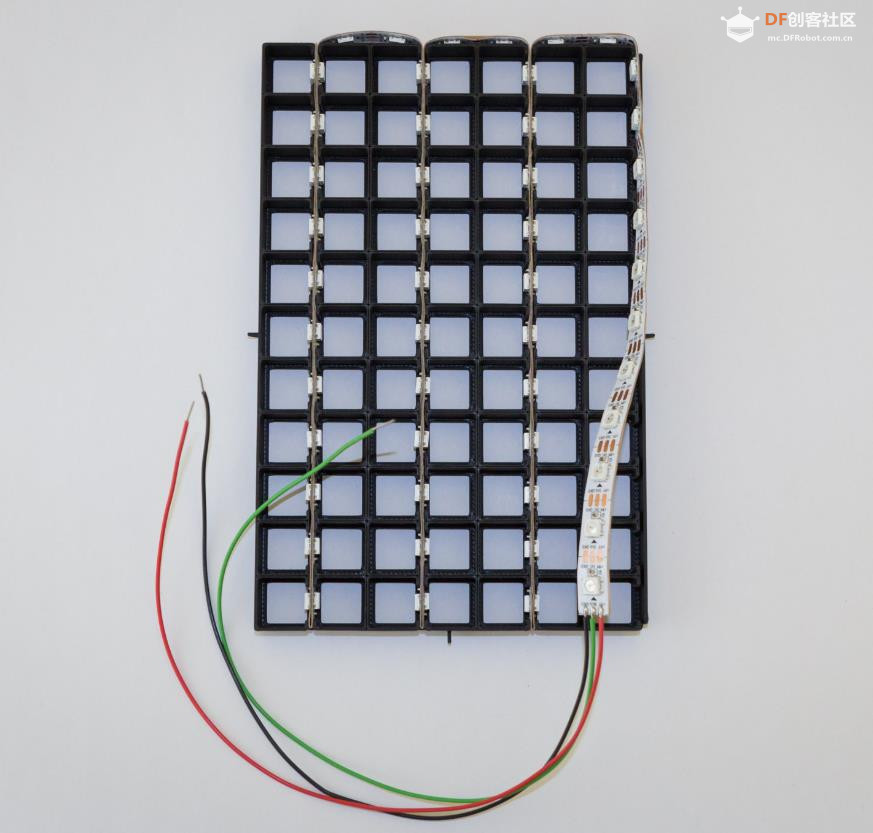
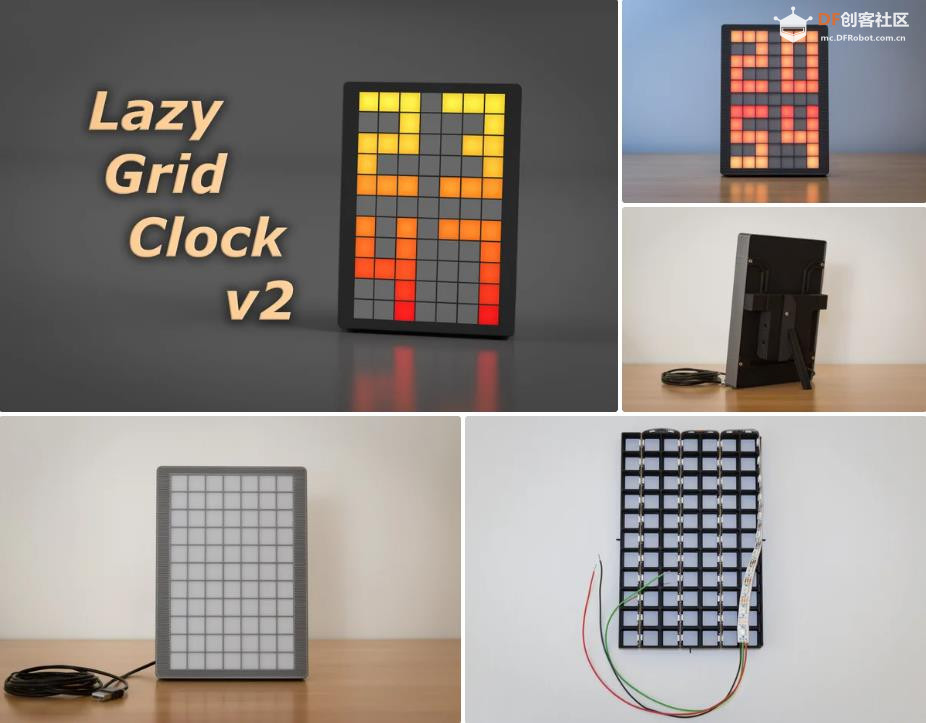
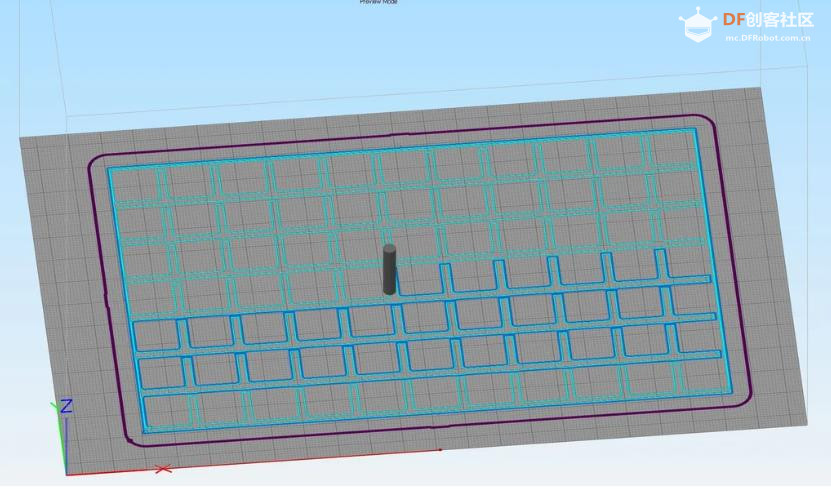
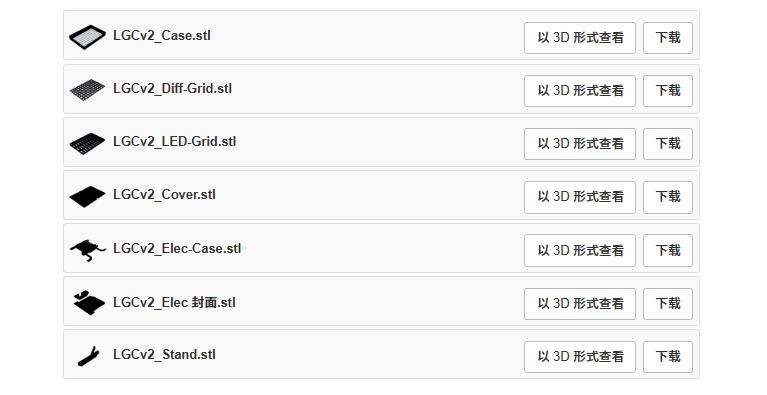
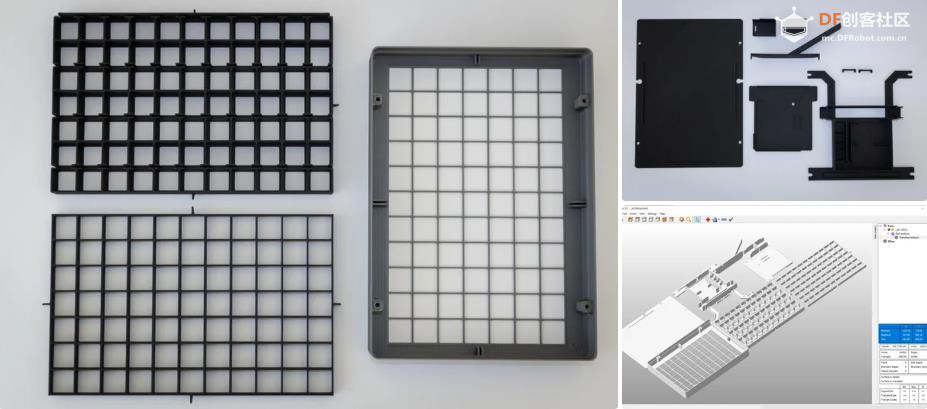
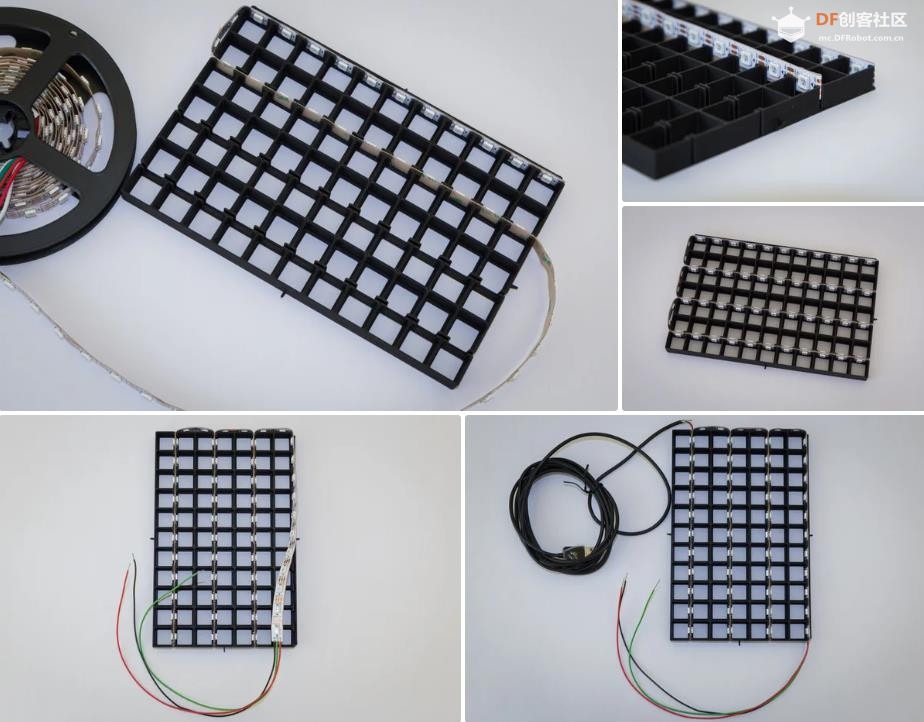
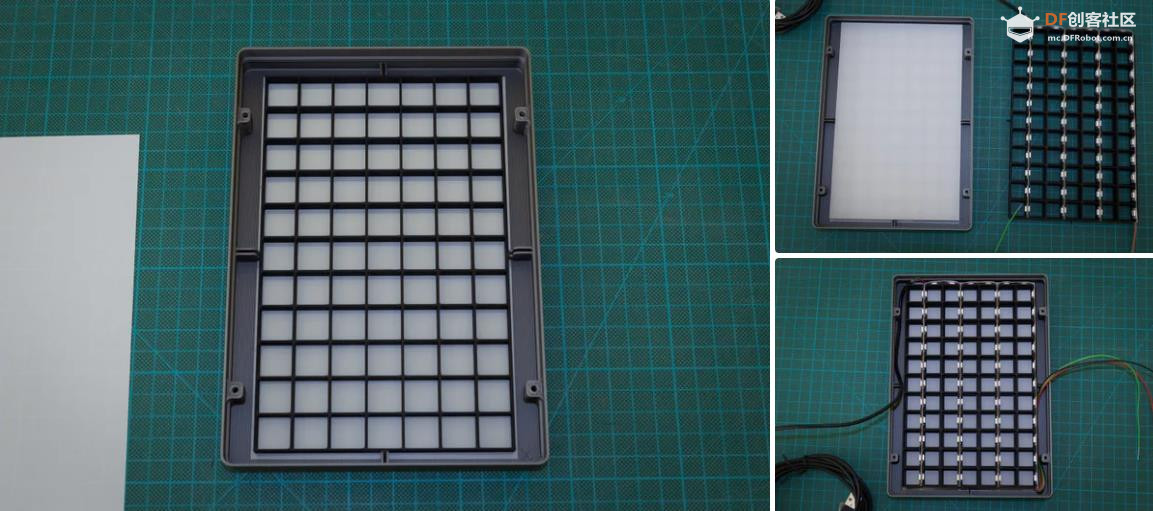
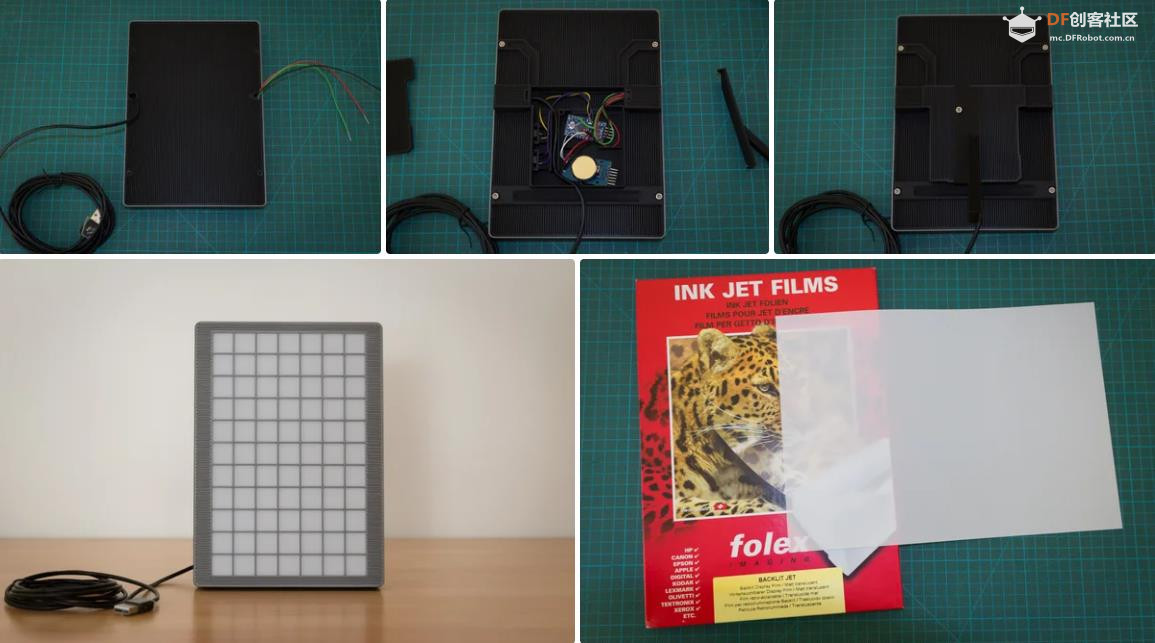
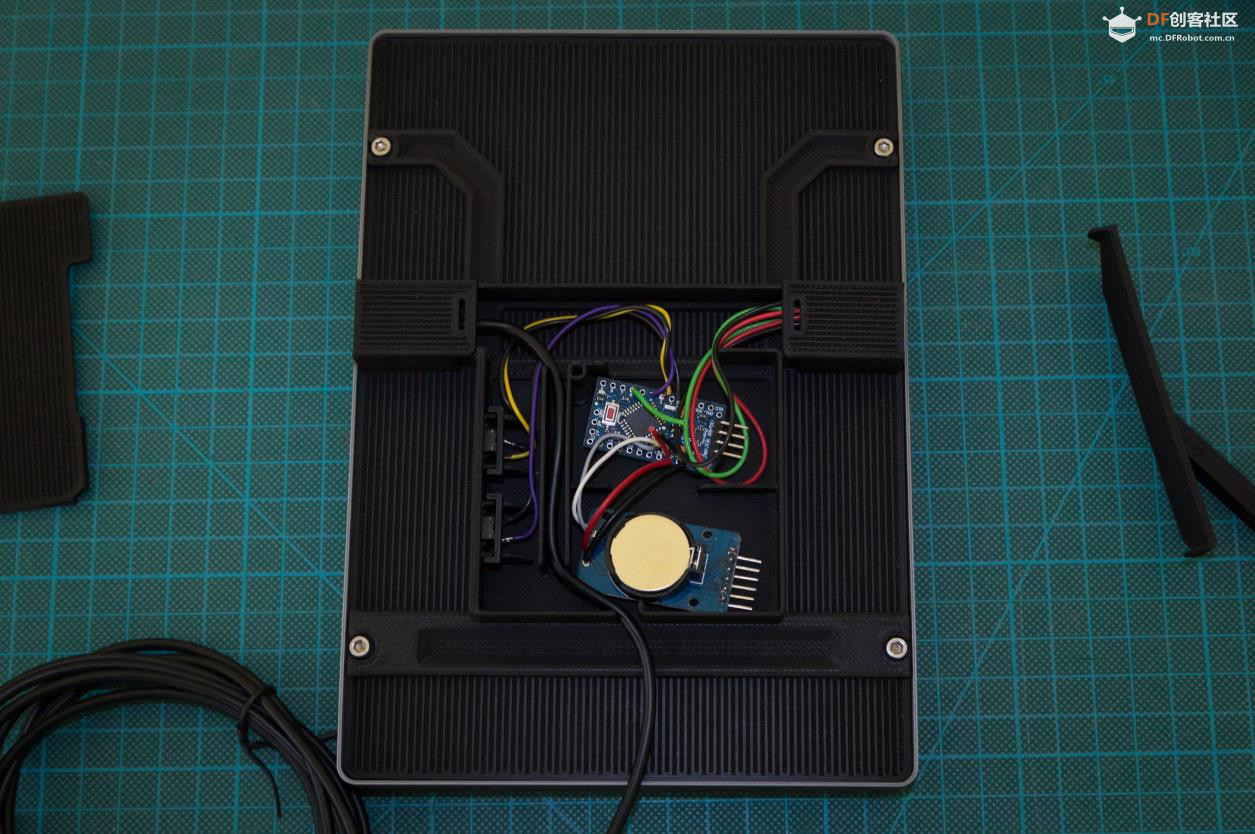
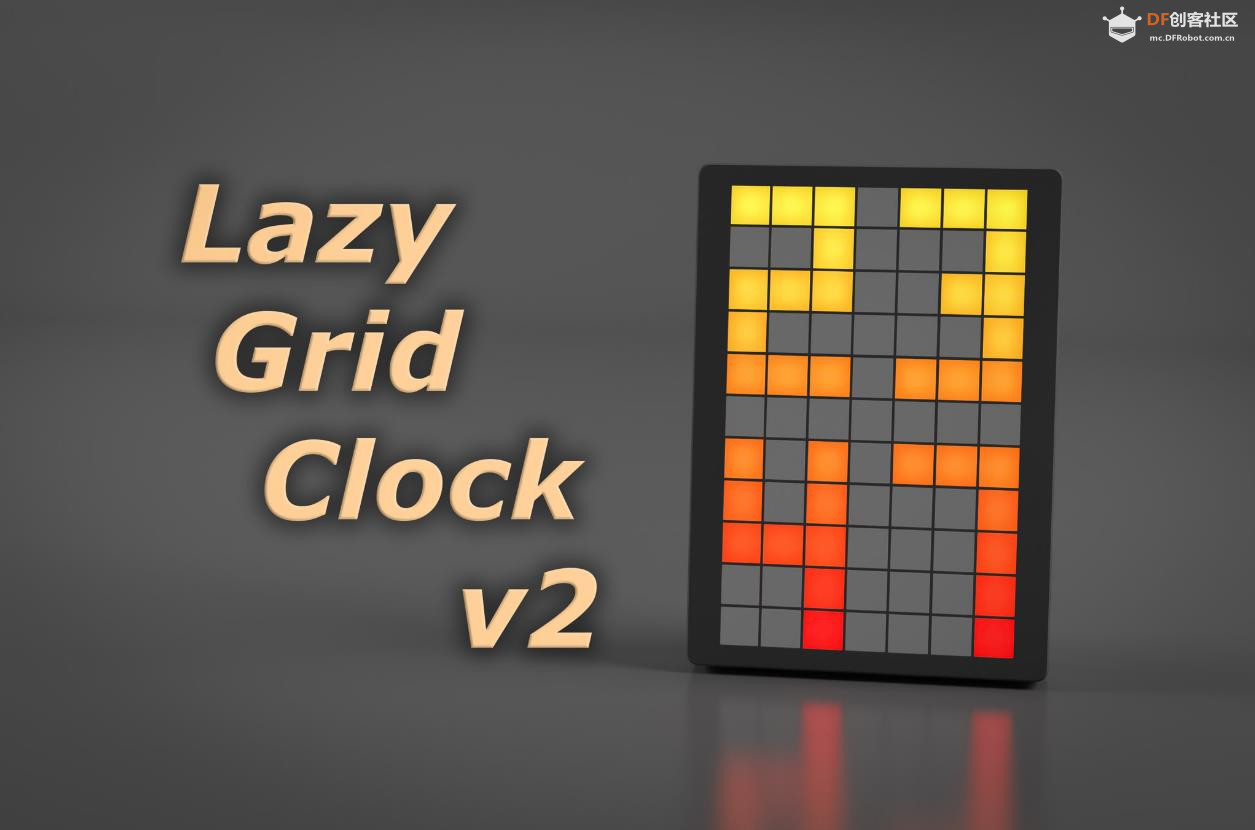
 沪公网安备31011502402448
沪公网安备31011502402448